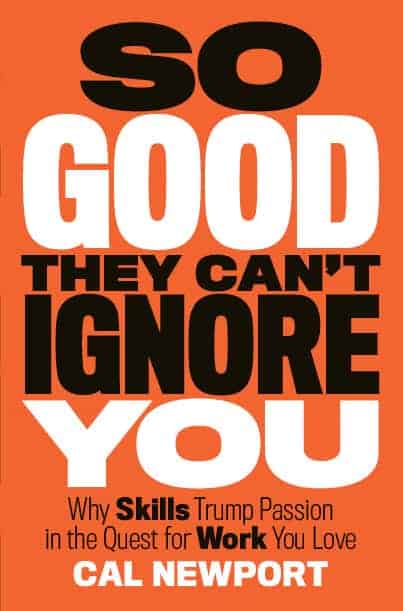
Cal Newport is on to something.
In his latest book, So Good They Can’t Ignore You, he goes against the grain of many popular theories that preach you should “follow your passion”. Instead, he suggests that skill trumps passion when it comes to a career.
And I think he’s right.
(Full disclosure: I received an advance copy of the book well before its release date, and Cal and I have had the chance to chat several times before (like in Portland at the World Domination Summit. I usually refer to authors by their surname when doing any sort of mention in an article…unless I decide that using their given name feels more natural due to my personal experience with them. This review led to such a decision, so “Cal” it is. Furthermore, this isn’t going to be your conventional book review. And if you buy it from my links in the article, I get a bit of money from Amazon. There. I’ve fully disclosed myself. Now let’s get on with it…)
If you asked me about whether I thought Cal was right back when I left my job at Costco then you’d hear me say “no way”.1 Instead I’ve had said that I was leaving Costco to follow my passion so that I could live a more happy and fulfilled life. But thinking back now, I realize that I was damn good at my job at Costco (until I had it set in my mind that I was not interested in being there anymore), and I’d managed to move my way up the ladder – and across the country – because of my skills. A lot of what Cal says in his book not only resonates with me now, but it applied to me nearly 7 years ago.
Working Right Trumps Finding the Right Work
When I left Costco, my intent was to become a comedy writer/performer, and I was truly passionate about it. I had written an email to Jonathan Coulton about it, I had been working hard for years in comedy in my city, and I’d freed up a whole bunch of time by leaving my day job to make it happen. But unlike with Costco, I hadn’t built up the right kind of what Cal calls “career capital” to increase my chances of success. I made a series of other errors during that time as well, but I think that not having that bank of career capital was perhaps the greatest one of all.
Now I look back from where I stand today and I can say that I’ve adopted the mindset that will lead me to that place of being “so good they can’t ignore you” . That’s because I’ve taken on the “craftsman’s mindset” as opposed to the “passion mindset”, which Cal differentiates as follows:
“Whereas the craftsman mindset focuses on what you can offer the world, the passion mindset focuses instead on what the world can offer you.”
An Eventual Mindset Shift
Upon reading Cal’s description of those mindsets and the differences between them, I came to the conclusion that my pursuit of comedy (both as I’d mentioned earlier and my creation of Eventualism) fell into the passion mindset rather than in the craftsman mindset. That’s because I was more concerned about what the world could/would offer me by pursuing those things rather than what I could/would offer the world. I enjoyed entertaining people (and still very much do), but because I was so into escaping my work life through making these pursuits my new work, I was short hanging myself and my audience as a result. I’m not suggesting that I didn’t do good work – I just wasn’t doing work that was so good that it couldn’t be ignored.
But why?
Cal discusses the idea of deliberate practice in the book, and that’s where I believe I dropped the ball. I was so concerned with moving forward that I didn’t concern myself with doing what it took to move forward in a way that better prepared me for any future success.
Instead, I kept writing checks that my career capital couldn’t cover.
Fast forward to today
I write a lot. I am starting to keep track of the time I spend on deliberate practice (something Cal highly recommends) as opposed to simply keeping track of time. I focus over the long term on the things that are important to me and deal swiftly with those things that don’t. I pay more attention. I work hard…and I work right.
This article may have seemed to be a lot more about me than about Cal’s book, but I think that if you read between the lines you’ll see how much So Good They Can’t Ignore You repositioned me. I had begun reading it when I decided to kill Eventualism. I started using 30/30 with a clearer purpose. I began to use a journal to track my hours of deliberate practice after reading Cal’s thoughts on it within the pages of this simply stellar book.
I have become better as a result of reading So Good They Can’t Ignore You. That’s something that can’t be ignored, and I believe the next result will be that I’ll embody the Steve Martin quote on which the title of this book is based.
This is no ordinary book. This is an extraordinary book.
1 I talk at length about my risky career move on Episode 33 of the Mikes on Mics podcast.

